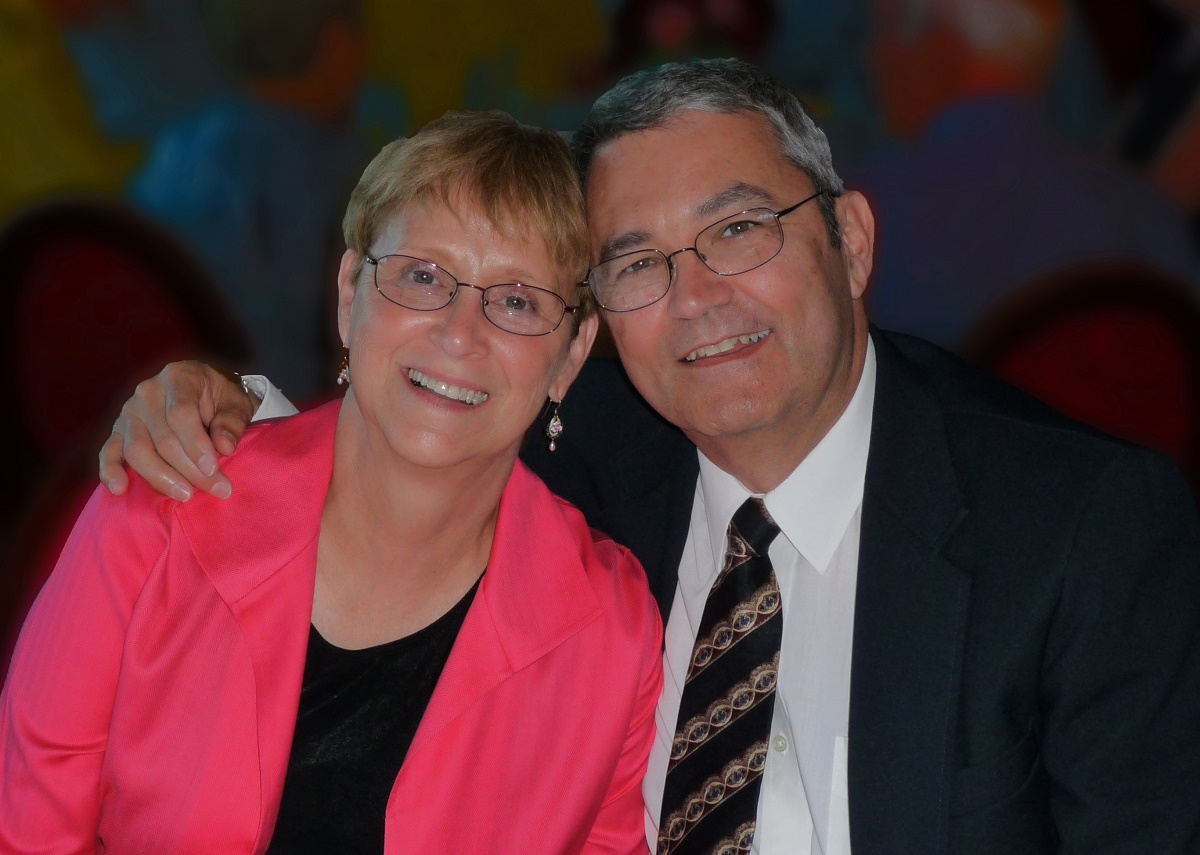 Mike and Kitty Schlueter of Savoy have been Carle patients since they moved to the Champaign-Urbana area in 1985. James C. Leonard, MD, now Carle’s president and CEO, was their first primary care provider (PCP). These days they see Carle Internal Medicine residents at the suggestion of current PCP Jennie Hsu-Lumetta, MD, FACP.
Mike and Kitty Schlueter of Savoy have been Carle patients since they moved to the Champaign-Urbana area in 1985. James C. Leonard, MD, now Carle’s president and CEO, was their first primary care provider (PCP). These days they see Carle Internal Medicine residents at the suggestion of current PCP Jennie Hsu-Lumetta, MD, FACP.
The Schlueters credit Dr. Hsu-Lumetta with making sure Mike got his first angiogram – which led to four stents in his heart and prevented an impending heart attack. His last procedure in 2016 came after take-home monitoring showed Mike had atrial fibrillation (Afib). Kitty, who now copes with Afib, as well, insists Dr. Hsu-Lumetta’s style and smarts help patients with a host of heart and other concerns.
“She’s quick to get us to a specialist if that’s what we need,” Kitty said, adding, “Plus, she listens.”
Dr. Hsu-Lumetta and Carle providers and leaders are passing those skills on to the Carle Illinois College of Medicine’s first class of future physician engineers. They’re also giving their students real-world opportunities to see how research shapes patient care.
Valuable information Carle Illinois College of Medicine students collected while working with Carle patients appeared in research findings published recently in The Heart Rhythm Journal. Carle was one of five sites nationwide for the study – sponsored by a grant from the American College of Physicians and the Heart Rhythm Society – which aimed to outline the value of Afib screenings and education to help prevent strokes.
Screenings took only minutes using hand-held devices that pair with smartphones and tablets to measure and report a person’s heart rhythm. Carle Illinois faculty, medical students, Carle Internal Medicine residents, Carle nurses, Carle student volunteers, the Carle Neuroscience Institute and the Stephens Family Clinical Research Institute staff collaborated on the screening study.
 Through a host of recruitment channels, Carle drew attendees to three screening events focused on raising awareness about Afib to help with prevention and managing the condition. Afib symptoms to watch for include irregular heartbeat – often a racing or flip-flopping feeling in the chest – as well as feeling dizzy, lightheaded or confused.
Through a host of recruitment channels, Carle drew attendees to three screening events focused on raising awareness about Afib to help with prevention and managing the condition. Afib symptoms to watch for include irregular heartbeat – often a racing or flip-flopping feeling in the chest – as well as feeling dizzy, lightheaded or confused.
“People want this kind of education. The events were extremely well attended,” said Karen P. Wiarda, DO, a cardiologist at Carle Heart and Vascular Institute in Mattoon who partnered with Dr. Hsu-Lumetta and Carle’s stroke program coordinator Erin Eddy, BSN, RN, on the new endeavor.
“It’s important for patients to better understand disease and risk, what can happen and how they can make changes.”
In other words, “It gets people thinking,” Dr. Hsu-Lumetta said.
And it gets data flowing. The study collected information that will help researchers and practitioners understand how great the risk of Afib is in this primarily rural region. Those on the frontlines of patient care can then adapt their processes and educational offerings to make the greatest impact.
The significance of this work is not lost on Anne Marie Smith, MBA, PMP, vice president, Quality Improvement Education, of the Washington, D.C.-based Heart Rhythm Society.
“We are grateful for the contributions of the five sites and many, many individuals who worked so hard to improve care for individuals with atrial fibrillation,” she said, referencing the white paper about the project.
Some health insurers also stepped up to provide the education their Medicare Advantage and other members need.
Early this year, Champaign-based Health Alliance opened Health Alliance Connections at 3301 Fields South Drive, Suite 105, at the new Carle at The Fields development.
“At Health Alliance Connections, we offer member education about diabetes, blood pressure, stress and lifestyle in addition to hands-on classes like cooking demonstrations and fitness classes,” said Ashley Quinlan, Health Alliance Connections program manager.
“Health Alliance Connections is a wonderful place for community members to gather and get healthy together.”
Even early in Carle Illinois College of Medicine students’ experience, getting to know real patients and their community plays an essential role in their development as physicians.
“The students loved engaging with people who came out to our Afib screening events. They appreciate the opportunity to educate, and they want to do it again,” Dr. Hsu-Lumetta said.
 The Schlueters were well-versed in cardiac care by the time they attended one of the screening events, again because of Dr. Hsu-Lumetta’s guidance.
The Schlueters were well-versed in cardiac care by the time they attended one of the screening events, again because of Dr. Hsu-Lumetta’s guidance.
When it comes to boosting his activity level, Mike Schlueter never intended to be anyone’s poster child. As it turns out, he doesn’t mind.
“Early in my retirement, I didn’t get much exercise. I started taking 20-minute brisk walks, and I lost 20 pounds,” he said. “My blood pressure and cholesterol numbers improved. That one change made a big difference. …
“If my experience makes someone go to the doctor so they improve their heart health, I’m all for sharing it.”
Categories: Culture of Quality, Staying Healthy
Tags: Carle, innovation, AFib, research, college, Hsu-Lumetta, atrial fibrillation, heart and vascular
